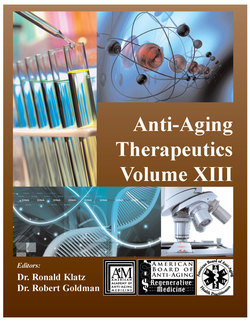Читать книгу Anti-Aging Therapeutics Volume XIII - A4M American Academy - Страница 57
На сайте Литреса книга снята с продажи.
CONCLUDING REMARKS
ОглавлениеDespite the multitude of reported studies on resveratrol, the number of clinical trials completed and reported numbers in the single digits, and its potential as an anti-aging compound remains to be fully determined. Level 1 evidence is lacking, and so clinical use of resveratrol is somewhat speculative at this time. In terms of the criteria established for a “true” anti-aging compound, the first – support of youthful appearance – appears to be the closest to fulfillment.
The second criterion, slowing of age-related cellular processes leading to delayed onset and prevention of degenerative diseases, is well supported by in vitro and animal studies but clinical evidence is lacking. Given the long time frame involved in conducting prospective trials for diseases in this category, it could be many years before answers are in. Funding such studies is an ongoing challenge, so the private sector is focusing on proprietary derivatives, which may have more targeted and potent actions.
Resveratrol is not a direct sirtuin activator and appears unlikely to produce lifespan extension as a caloric restriction mimetic. On an experimental basis resveratrol has been useful in developing sirtuin science, and uncovering metabolic pathways that could possibly be exploited to achieve that goal. It is possible and even likely that resveratrol could produce a secondary effect of lifespan extension via reduction in the incidence of diseases of aging, but again that remains to be proven. The marketing of resveratrol supplements based on lifespan extension documented only in sub-mammalian organisms is therefore a questionable practice. Resveratrol alone does not provide an explanation for the known health benefits of moderate regular wine consumption, in that resveratrol content in wine is too low to produce the in vitro effects that correspond to epidemiologic patterns.
Bioavailability remains problematic as well. Newer formulations may help to overcome current limitations on the uptake and metabolism of resveratrol, along with better understanding of membrane transport, intracellular/extracellular partitioning, and the actions of resveratrol metabolites. But given the many open questions that remain, and potential risks (particularly related to its phytoestrogen activity), a cautionary approach is prudent and the widespread use of resveratrol supplements is not justified at the present time.
